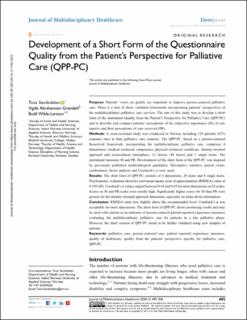Development of a short form of the questionnaire quality from the patient’s perspective for palliative care (QPP-PC)
Peer reviewed, Journal article
Published version
Permanent lenke
https://hdl.handle.net/11250/2728712Utgivelsesdato
2020Metadata
Vis full innførselSamlinger
Sammendrag
Purpose: Patients’ views on quality are important to improve person-centered palliative care. There is a lack of short, validated instruments incorporating patients’ perspectives of the multidisciplinary palliative care services. The aim of this study was to develop a short form of the instrument Quality from the Patient’s Perspective for Palliative Care (QPP-PC) and to describe and compare patients’ perceptions of the subjective importance (SI) of care aspects and their perceptions of care received (PR). Methods: A cross-sectional study was conducted in Norway including 128 patients (67% response rate) in four palliative care contexts. The QPP-PC, based on a person-centered theoretical framework, incorporating the multidisciplinary palliative care, comprises 4 dimensions; medical–technical competence, physical–technical conditions, identity-oriented approach and sociocultural atmosphere, 12 factors (49 items) and 3 single items. The instrument measures SI and PR. Development of the short form of the QPP-PC was inspired by previously published methodological guidelines. Descriptive statistics, paired t-tests, confirmatory factor analysis and Cronbach’s α were used. Results: The short form of QPP-PC consists of 4 dimensions, 20 items and 4 single items. Psychometric evaluation showed a root-mean-square error of approximation (RMSEA) value of 0.109 (SI). Cronbach’s α values ranged between 0.64 and 0.85 for most dimensions on SI scales. Scores on SI and PR scales were mostly high. Significantly higher scores for SI than PR were present for the identity-oriented approach dimension, especially on items about information. Conclusion: RMSEA value was slightly above the recommended level. Cronbach’s α was acceptable for most dimensions. The short form of QPP-PC shows promising results and may be used with caution as an indicator of person-centered patient-reported experience measures evaluating the multidisciplinary palliative care for patients in a late palliative phase. However, the short version of QPP-PC needs to be further validated using new samples of patients.

